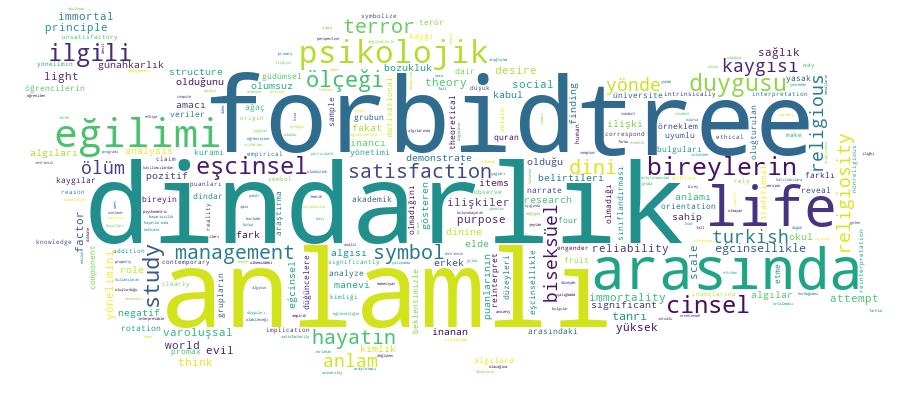Kıraç, Ferdi
Loading...

Profile URL
Name Variants
Kirac, Ferdi
Job Title
Dr. Öğr. Üyesi
Email Address
Main Affiliation
Department of Psychology / Psikoloji Bölümü
Status
Former Staff
Website
ORCID ID
Scopus Author ID
Turkish CoHE Profile ID
Google Scholar ID
WoS Researcher ID
Sustainable Development Goals
SDG data is not available

This researcher does not have a Scopus ID.

This researcher does not have a WoS ID.

Scholarly Output
9
Articles
4
Views / Downloads
64/647
Supervised MSc Theses
1
Supervised PhD Theses
0
WoS Citation Count
8
Scopus Citation Count
11
WoS h-index
1
Scopus h-index
1
Patents
0
Projects
0
WoS Citations per Publication
0.89
Scopus Citations per Publication
1.22
Open Access Source
8
Supervised Theses
1
Google Analytics Visitor Traffic
| Journal | Count |
|---|---|
| INSAN & TOPLUM-THE JOURNAL OF HUMANITY & SOCIETY | 1 |
| Journal of Homosexuality | 1 |
Current Page: 1 / 1
Scopus Quartile Distribution
Competency Cloud

6 results
Scholarly Output Search Results
Now showing 1 - 6 of 6
Article Dindar eşcinsel bireyin manevi ve cinsel kimlik ikilemi: Müslüman gay ve biseksüel erkek örneklem(The Journal of International Social Research, 2014) Kıraç, FerdiBu çalışmanın amacı, cinsel yönelimi ve manevi kimliği ile yüzleşen dindar eşcinsel bireyin, manevi ve cinsel kimliği arasında bir ikilem yaşayıp yaşamadığını ortaya koymaktır. Eşcinsel bireylerin, eşcinsel yönelimin cinsel kimlik karmaşası olup olmadığı ve eşcinsel yönelimin heteroseksüel yönelime değiştirilip değiştirilemeyeceğine dair inançlarına göre, dindarlık ve hayatın anlamı puanlarının anlamlı olarak farklılaşacağı tahmin edilmiştir. Çalışmaya, İslam dinine inanan üç yüz seksen iki Türkiyeli gay ve biseksüel erkek katılmıştır. Eşcinsel bireylerin, eşcinsellikle ilgili inançlarına göre iki temel grup ortaya çıkmıştır. Araştırma bulguları, birinci grubu oluşturan ve cinsel yönelimini kabul etme eğilimi gösteren eşcinsel bireylerin, dindarlık puanlarının düşük, hayatın anlamı puanlarının ise yüksek olduğunu göstermiştir. Diğer taraftan, ikinci gruptaki, cinsel yönelimini reddetme eğilimi gösteren eşcinsel bireylerin dindarlık puanları yüksek, hayatın anlamı puanları ise düşük bulunmuştur. Sonuçlar, Festinger’in Bilişsel Çelişki Kuramı bağlamında tartışılmıştırArticle The Forbidden Tree: A Terror Management Perspective(ILEM, 2018) Kirac, FerdiIn this theoretical study, the symbol of the forbidden tree narrated in Quran (forbidden fruit in Bible) was analyzed and reinterpreted in the light of Terror Management Theory, a motivational theory of social psychology. The traditional interpretations made on the sembol of the forbidden tree that has significant implications for the origin of evil in the world, were thought to be unsatisfactory to demonstrate the ethical principle the forbidden tree conveyed. In addition, it was observed that what the forbidden tree symbol corresponded to in social life was not clearly explained. For that reason, a reinterpretation of the forbidden tree symbol in the light of contemporary knowledge was thought to be necessary. In the study, it was claimed that the reality symbolized with the forbidden tree was the desire to be immortal and all human attempts to achive immortality. Relying on the empirical findings obtained from terror management research, the ways how the desire for immortality and the attempts to he immortal engendered evil in the world was clarified.Article PSYCHOMETRIC PROPORTIES OF THE PURPOSE IN LIFE SCALE: FACTOR STRUCTURE AND RELIABILITY(The Journal of International Social Research, 2015) Kıraç, FerdiThe aim of this study is to examine the factor structure and reliability of the Purpose in Life scale (PIL) in Turkish culture.1367 university students volunteered to participate in the study. A principle component analysis with promax rotation revealed that four items failed to meet a minimum criteria of having a primary factor loading of .4 or above and no-cross-loading of .3 or above. Excluding those four items, a principle component analysis with promax rotation with 16 items of PIL was conducted again. The result demonstrated that the Turkish version of PIL had three interpretable factors: Quality of Life, Meaning and Purpose, Freedom. A Cronbach’s alpha of .91and a split-half reliability of .92 were computed for the scale, indicating that the scale is satisfactorily reliable.Article Citation - WoS: 8Citation - Scopus: 11The Role of Religiosity in Satisfaction With Life: A Sample of Turkish Gay Men(Journal of Homosexuality, 2016) Kıraç, FerdiIn this study, we investigated the role of religiosity in satisfaction with life in a sample of Turkish gay men. A one-way analysis of covariance (ANCOVA) revealed that the religiosity had a significant effect on life satisfaction of gay men. Extrinsically religious gay men displayed significantly higher life satisfaction scores than both intrinsically religious and nonreligious gay men. Moreover, intrinsically religious and nonreligious gay men did not significantly differ in terms of life satisfaction. Based on the findings of the study, we concluded that the role of a committed religiosity in enhancing satisfaction with life as documented by the overwhelming majority of previous research was reversed in the case of Turkish Muslim gay menOther Terör Yönetimi Kuramı Işığında Yasak Ağaç(İnsan & Toplum, 2018) Kıraç, Fredi; Kıraç, FerdiIn this theoretical study, the symbol of the forbidden tree narrated in Quran (forbidden fruit in Bible) was analyzed and reinterpreted in the light of Terror Management Theory, a motivational theory of social psychology. The traditional interpretations made on the sembol of the forbidden tree that has significant implications for the origin of evil in the world, were thought to be unsatisfactory to demonstrate the ethical principle the forbidden tree conveyed. In addition, it was observed that what the forbidden tree symbol corresponded to in social life was not clearly explained. For that reason, a reinterpretation of the forbidden tree symbol in the light of contemporary knowledge was thought to be necessary. In the study, it was claimed that the reality symbolized with the forbidden tree was the desire to be immortal and all human attempts to achive immortality. Relying on the empirical findings obtained from terror management research, the ways how the desire for immortality and the attempts to be immortal engendered evil in the world was clarified.Other ‘‘Öğrenilen başarısızlık’’: Türkiye’de okul sınıflandırması ve öğrencilerin akademik öz-yeterliği algıları ile(Anı Yayıncılık, 2017) Sakız, Halis; Baş, Güldest; Kıraç, Ferdi…

